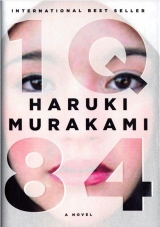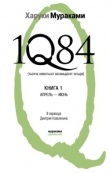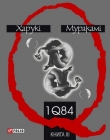
Текст книги "1q84"
Автор книги: Haruki Murakami
Жанр:
Современная проза
сообщить о нарушении
Текущая страница: 53 (всего у книги 81 страниц)
The people seemed to do their work efficiently, with no wasted effort. They tried not to make any unnecessary noise, and their footsteps, too, were quiet. They were finished in about twenty minutes. Then they opened the front door and left. She heard them lock the front door from the outside, and then the doorbell rang once as a signal. To be on the safe side, Aomame waited fifteen minutes. Then she exited the bedroom, made sure no one else was there, and locked the dead bolt on the front door.
The large fridge was crammed full of a week’s worth of food. This time it wasn’t the kind of food you popped in the microwave, but mostly fresh groceries: a variety of fruits and vegetables; fish and meat; tofu, wakame, and natto. Milk, cheese, and orange juice. A dozen eggs. So there wouldn’t be any extra garbage, they had taken everything out of their original containers and then neatly rewrapped them in plastic wrap. They had done a good job understanding the type of food she normally ate. How would they know this? she wondered. A stationary bicycle was set down next to the window, a small but high-end model. The digital display on it showed speed, distance, and calories burned. You could also monitor rpms and heart rate. There was a bench press to work on abs, deltoids, and triceps, the kind of equipment that was easy to assemble and disassemble. Aomame was quite familiar with it. It was the newest type, a very simple design yet very effective. With these two pieces of equipment she would have no trouble keeping in shape.
A metal bat in a soft case was there as well. Aomame took it out of the case and took a few swings. The shiny, new silver bat swished sharply through the air. The old familiar heft of it calmed her. The feel of the bat in her hands brought back memories of her teenage years, and the time she had spent with Tamaki Otsuka.
All seven volumes of In Search of Lost Time were piled up on the dining table. They were not new copies, but they appeared to be unread. Aomame flipped through one. There were several magazines, too—weekly and monthly magazines—and five brand-new videos, still in their plastic wrap. She had no idea who had chosen them, but they were all new movies she had never seen. She was not in the habit of going to movie theaters, so there were always a lot of new films that she missed.
There were three brand-new sweaters in a large department-store shopping bag, in different thicknesses. There were two thick flannel shirts, and four long-sleeved T-shirts. All of them were in plain fabric and simple designs. They were all the perfect size. There were also some thick socks and tights. If she was going to be here until December, she would need them. Her handlers knew what they were doing.
She took the clothes into the bedroom and folded them to store in drawers or hung them on hangers in the closet. She had gone back to the kitchen and was drinking coffee when the phone rang. It rang three times, stopped, then rang again.
“Did you get everything?” Tamaru asked.
“Yes, thank you. I think I have everything I need now. The exercise equipment is more than enough. Now I just have to crack open Proust.”
“If there is anything that we’ve overlooked, don’t hesitate to tell me.”
“I won’t,” Aomame said. “Though I don’t think it would be easy to find anything you have overlooked.”
Tamaru cleared his throat. “This might not be my business, but do you mind if I give you a warning?”
“Go right ahead.”
“Unless you have experienced it, being shut up in a small place by yourself, unable to see or talk to anyone else, is not the easiest thing in the world. No matter how tough a person might be, eventually he is going to make a sound. Especially when someone is after you.”
“I haven’t been living in very spacious places up till now.”
“That could be an advantage,” Tamaru said. “Still, I want you to be very careful. If a person remains tense for a long time he might not notice it himself, but it’s like his nerves are a piece of rubber that has been stretched out. It’s hard to go back to the original shape.”
“I’ll be careful,” Aomame said.
“As I said before, you are a very cautious person. You’re practical and patient, not overconfident. But no matter how careful a person might be, once your concentration slips, you will definitely make one or two mistakes. Loneliness becomes an acid that eats away at you.”
“I don’t think I’m lonely,” Aomame declared. She said this half to Tamaru, and half to herself. “I’m all alone, but I’m not lonely.”
There was silence on the other end of the phone, as if Tamaru were giving serious thought to the difference between being alone and being lonely.
“At any rate I’ll be more cautious than I have been,” Aomame said. “Thank you for the advice.”
“There is one thing I’d like you to understand,” Tamaru said. “We will do whatever we can to protect you. But if some emergency situation arises—what that might be, I don’t know—you may have to deal with it yourself. I can run over there as fast as possible and still might not make it in time. Depending on the situation, I may not be able to get there at all. For instance, if it is no longer desirable for us to have a connection with you.”
“I understand completely. I plan to protect myself. With the bat, and with the thing you gave me.”
“It’s a tough world.”
“Wherever there’s hope there’s a trial,” Aomame said.
Tamaru was silent again for a moment, and then spoke. “Have you heard about the final tests given to candidates to become interrogators for Stalin’s secret police?”
“No, I haven’t.”
“A candidate would be put in a square room. The only thing in the room is an ordinary small wooden chair. And the interrogator’s boss gives him an order. He says, ‘Get this chair to confess and write up a report on it. Until you do this, you can’t leave this room.’ ”
“Sounds pretty surreal.”
“No, it isn’t. It’s not surreal at all. It’s a real story. Stalin actually did create that kind of paranoia, and some ten million people died on his watch—most of them his fellow countrymen. And we actually live in that kind of world. Don’t ever forget that.”
“You’re full of heartwarming stories, aren’t you.”
“Not really. I just have a few set aside, just in case. I never received a formal education. I just learned whatever looked useful, as I experienced it. Wherever there’s hope there’s a trial. You’re exactly right. Absolutely. Hope, however, is limited, and generally abstract, while there are countless trials, and they tend to be concrete. That is also something I had to learn on my own.”
“So what kind of confession did the interrogator candidates extract from the chairs?”
“That is a question definitely worth considering,” Tamaru said. “Sort of like a Zen koan.”
“Stalinist Zen,” Aomame said.
After a short pause, Tamaru hung up.
That afternoon she worked out on the stationary bike and the bench press. Aomame enjoyed the moderate workout, her first in a while. Afterward she showered, then made dinner while listening to an FM station. In the evening she checked the TV news (though not a single item caught her interest). After the sun had set she went out to the balcony to watch the playground, with her usual blanket, binoculars, and pistol. And her shiny brand-new bat.
If Tengo doesn’t show up by then, she thought, I guess I will see out this enigmatic year of 1Q84 in this corner of Koenji, one monotonous day after another. I’ll cook, exercise, check the news, and work my way through Proust—and wait for Tengo to show up at the playground. Waiting for him is the central task of my life. Right now that slender thread is what is barely keeping me alive. It’s like that spider I saw when I was climbing down the emergency stairway on the Metropolitan Expressway No. 3. A tiny black spider that had spun a pathetic little web in a corner of the grimy steel frame and was silently lying in wait. The wind from under the bridge had blown the spider web, which hung there precariously, tattered and full of dust. When I first saw it, I thought it was pitiful. But right now I’m in the same situation.
I have to get ahold of a recording of Janáček’s Sinfonietta. I need it when I’m working out. It makes me feel connected. It’s as if that music is leading me to something. To what, though, I can’t say. She made a mental note to add that to the next list of supplies.
It was October now. There were less than three months left of her reprieve. The clock kept ticking away, ceaselessly. Aomame sank down into her garden chair and continued to watch the slide in the playground through the plastic blinds. The little children’s playground looked pale under the mercury-vapor lamp. The scene made Aomame think of deserted hallways in an aquarium at night. Invisible, imaginary fish were swimming noiselessly through the trees, never halting their silent movements. And two moons hung in the sky, waiting for Aomame’s acknowledgment.
“Tengo,” she whispered. “Where are you?”
CHAPTER 3
Tengo
THE ANIMALS ALL WORE CLOTHES
In the afternoons Tengo would visit his father in the hospital, sit next to his bed, open the book he brought, and read aloud. After reading five pages he would take a short break, then read five more pages. He read whatever book he happened to be reading on his own at the time. Sometimes it was a novel, or a biography, or a book on the natural sciences. What was most important was the act of reading the sentences aloud, not the contents.
Tengo didn’t know if his father actually heard his voice. His face never showed any reaction. This thin, shabby-looking old man had his eyes closed, and he was asleep. He didn’t move at all, and his breathing wasn’t audible. He was breathing, but unless you brought your ear very close, or held a mirror up to his nose to see if it clouded, you couldn’t really tell. The liquid in the IV drip went into his body, and a tiny amount of urine oozed out the catheter. The only thing that revealed that he was alive was this silent, slow movement in and out. Occasionally a nurse would shave his beard with an electric razor and use a tiny pair of scissors with rounded-off tips to clip the white hairs growing out of his ears and nose. She would trim his eyebrows as well. Even though he was unconscious, these continued to grow. As he watched his father, Tengo started to have doubts about the difference between a person being alive and being dead. Maybe there really wasn’t much of a difference to begin with, he thought. Maybe we just decided, for convenience’s sake, to insist on a difference.
At three the doctor came and gave Tengo an update on his father’s condition. The explanation was always concise, and it was nearly the same from one day to the next. There was no change. The old man was simply asleep, his life gradually fading away. In other words, death was approaching, slowly but certainly, and there was nothing medically speaking that could be done. Just let him lie here, quietly sleeping. That’s about all the doctor could say.
In the evenings two male nurses would come and take his father to an examination room. The male nurses differed depending on the day, but both of them were taciturn. Perhaps the masks they wore had something to do with it, but they never said a word. One of them looked foreign. He was short and dark skinned, and was always smiling at Tengo through his mask. Tengo could tell he was smiling by his eyes. Tengo smiled back and nodded.
Anywhere from a half hour to an hour later, his father would be brought back to his room. Tengo had no idea what kind of examinations they were conducting. While his father was gone he would go to the cafeteria, have some hot green tea, and stay about fifteen minutes before going back to the hospital room. All the while he held on to the hope that when he returned an air chrysalis would once again materialize, with Aomame as a young girl lying inside. But all that greeted him in the gloomy hospital room was the smell of a sick person and the depressions left behind in the empty bed.
Tengo stood by the window and looked at the scene outside. Beyond the garden and lawn was the dark line of the pine windbreak, through which came the sound of waves. The rough waves of the Pacific. It was a thick, darkish sound, as if many souls were gathered, each whispering his story. They seemed to be seeking more souls to join them, seeking even more stories to be told.
Before this, in October, Tengo had twice taken day trips, on his days off, to the sanatorium in Chikura. He would take the early-morning express train. Once there, he would sit beside his father’s bed, and talk to him sometimes. There was nothing even close to a response. His father just lay there, faceup, sound asleep. Tengo spent most of his time gazing out the window. As evening approached he waited for something to happen, but nothing ever did. The sun would silently sink, and the room would be wrapped in the gathering gloom. He would ultimately give up, leave, and take the last express train back to Tokyo.
Maybe I should be more patient, stay with him longer, Tengo thought once. Maybe visiting him for the day and then leaving isn’t enough. What’s needed, perhaps, is a deeper commitment. He had no concrete evidence that this was true. He just felt that way.
After the middle of November he took the vacation leave he had accumulated, telling the cram school that his father was in critical condition and he needed to look after him. This in itself wasn’t a lie. He asked a classmate from college to take over his classes. He was one of the relatively few people with whom Tengo had kept in touch, albeit just once or twice a year. Even in the math department, which had more than its share of oddballs, this guy was particularly odd, as well as smart beyond compare. After graduating, though, he didn’t get a job or go on to grad school. Instead, when he felt like it, he taught math at a private cram school for junior high students. Other than that, he read, went fly fishing, and did whatever he wanted. Tengo happened to know, however, that he was a very capable teacher. The thing was, he was tired of being so capable. Plus, he was from a wealthy family and there was no need for him to force himself to work. He had substituted for Tengo once before and the students had liked him. Tengo called him and explained the situation, and he immediately agreed to step in.
There was also the question of what to do about Fuka-Eri. Tengo couldn’t decide if leaving this naive girl behind in his apartment for a long time was the right thing to do. And besides, she was trying to hide out, to stay out of sight. So he asked her directly. “Are you okay on your own here for a while? Or would you like to go someplace else, temporarily?”
“Where are you going,” Fuka-Eri asked, a serious look in her eyes.
“To the cat town,” Tengo explained. “My father won’t regain consciousness. He’s been in a deep sleep for a while. They say he might not last long.”
He didn’t say a word about the air chrysalis appearing in the hospital room bed one evening. Or how Aomame appeared inside as a young girl, asleep. Or how the air chrysalis was exactly as Fuka-Eri had described it in her novel, down to the last detail. Or how he was secretly hoping that it would again appear before him.
Fuka-Eri narrowed her eyes, pursed her lips, and stared straight at Tengo, as if trying to make out a message written in tiny letters. Almost unconsciously he touched his face, but it didn’t feel as though something was written on it.
“That’s fine,” Fuka-Eri said after a while, and she nodded several times. “Do not worry about me. I will stay at home.” After thinking for a moment she added, “Right now there is no danger.”
“Right now there is no danger,” Tengo repeated.
“Do not worry about me,” she said again.
“I’ll call you every day.”
“Do not get abandoned in the cat town.”
“I’ll be careful,” Tengo said.
Tengo went to the supermarket and bought enough food so Fuka-Eri wouldn’t have to go shopping, all things that would be simple to prepare. Tengo was well aware that she had neither the ability nor the desire to do much cooking. He wanted to avoid coming back in two weeks to a fridge full of mushy, spoiled food.
He stuffed a vinyl bag full of clothes and toiletries, a few books, pens, and paper. As usual he took the express train from Tokyo Station, changed to a local train at Tateyama, and got off at Chikura. He went to the tourist information booth in front of the station to look for a fairly inexpensive hotel. It was the off-season, so he had no trouble finding a room in a simple Japanese-style inn that catered mainly to people coming to fish. The cramped but clean room smelled of fresh tatami. The fishing harbor was visible from the second-floor window. The charge for the room, which included breakfast, was cheaper than he had expected.
“I don’t know yet how long I’ll be staying,” Tengo said, “but I’ll go ahead and pay for three days.” The proprietress of the inn had no objection. The doors shut at eleven, and bringing a woman to his room would be problematic, she explained in a roundabout way. All this sounded fine to him. Once he settled into his room, he phoned the sanatorium. He told the nurse (the same middle-aged nurse he had met before) that he would like to visit his father at three p.m. and asked if that would be convenient. That would be fine, she replied. “Mr. Kawana just sleeps all the time,” she said.
Thus began Tengo’s days at the cat town beside the sea. He would get up early, take a walk along the shore, watch the fishing boats go in and out of the harbor, then return to the inn for breakfast. Breakfast was exactly the same every day—dried horse mackerel and fried eggs, a quartered tomato, seasoned dried seaweed, miso soup with shijimi clams, and rice—but for some reason it tasted wonderful every morning. After breakfast he would sit at a small desk and write. He hadn’t written in some time and found the act of writing with his fountain pen enjoyable. Working in an unfamiliar place, away from your daily routine, was invigorating. The engines of the fishing boats chugged monotonously as they pulled into the harbor. Tengo liked the sound.
The story he was writing began with a world where there were two moons in the sky. A world of Little People and air chrysalises. He had borrowed this world from Fuka-Eri’s Air Chrysalis, but by now it was entirely his own. As he wrote, his mind was living in that world. Even when he lay down his pen and stood up from the desk, his mind remained there. There was a special sensation of his body and his mind beginning to separate, and he could no longer distinguish the real world from the fictional. The protagonist of the story who entered the cat town probably experienced the same sensation. Before he knew it, the world’s center of gravity had shifted. And the protagonist would (most likely) be unable to ever board the train to get out of town.
At eleven Tengo had to leave his room so they could clean it. When the time came he stopped writing, went out, walked to the front of the station, and drank coffee in a nearby coffee shop. Occasionally he would have a light sandwich, but usually he ate nothing. He would then pick up the morning paper and check it closely to see if there was any article that might have something to do with him. He found no such article. Air Chrysalis had long since disappeared from the bestseller lists. Number one on the list now was a diet book entitled Eat as Much as You Want of the Food You Love and Still Lose Weight. What a great title. The whole book could be blank inside and it would still sell.
After he finished his coffee and was done with the paper, Tengo took the bus to the sanatorium. He usually arrived between one thirty and two. He chatted a bit with the nurse who was always at the front desk. When Tengo began staying in the town and visiting his father every day, the nurses grew kinder to him, and treated him in a friendly way—as warmly as the prodigal son’s family must have welcomed him back home.
One of the younger nurses always gave an embarrassed smile whenever she saw Tengo. She seemed to have a crush on him. She was petite, wore her hair in a ponytail, and had big eyes and red cheeks. She was probably in her early twenties. But ever since the air chrysalis had appeared with the sleeping girl inside, all Tengo could think about was Aomame. All other women were faint shadows in comparison. An image of Aomame was constantly playing at the edges of his mind. Aomame was alive somewhere in this world—he could feel it. He knew she must be searching for him, which is why on that evening she chose to find him. She had not forgotten him either.
If what I saw wasn’t an illusion.
Sometimes he remembered his older girlfriend, and wondered how she was. She’s irretrievably lost now, her husband had said on the phone. She can no longer visit your home. Irretrievably lost. Even now those words gave Tengo an uncomfortable, uneasy feeling. They had an undeniably ominous ring.
Still, she became less and less of a presence in his mind as time went on. He could recall the afternoons they had spent together only as events in the past, undertaken to fulfill certain goals. Tengo felt guilty about this. But before he had known it, gravity had changed. It had shifted, and it wouldn’t be going back to its original location.
When he arrived at his father’s room, Tengo would sit in the chair next to his bed and briefly greet him. Then he would explain, in chronological order, what he had done since the previous night. He hadn’t done much. He had gone back to town on the bus, had a simple dinner at a restaurant, drunk a beer, returned to the inn, and read. He’d gone to bed at ten. In the morning he would take a walk, eat breakfast, and work on his novel for about two hours. He repeated the same things every day, but even so, Tengo gave the unconscious man a detailed report on all his activities. There was no response from his listener. It was like talking to a wall. A formality he had to go through. Still, sometimes simple repetition has meaning.
Then Tengo would read from the book he had brought along. He didn’t stick to just one book. He would read aloud the book that he himself was reading at the time. If a manual for an electric lawn mower had been his current reading material, that’s what he would have read. Tengo read in a deliberately clear voice, slowly, so that it was easy to understand. That was the one thing he made sure to do.
The lightning outside grew steadily stronger and for a while the greenish light illuminated the road, but there was no rumble of thunder. Maybe there was thunder, but he felt unfocused. It was as if he couldn’t hear it. Rainwater flowed in small rivers along the road. After wading through the water, customers came into the shop, one after another.
His friend turned and stared. He went strangely quiet. There was a sudden commotion as customers pushed toward them, making it hard to breathe.
Someone cleared his throat, perhaps because a piece of food had gotten stuck; it was a strange voice, more of a snuffling cough, as if it were a dog.
Suddenly there was a huge flash of lightning that shone all the way inside the place, illuminating the people on the dirt floor. And just then a clap of thunder sounded, ready to crack the roof. Surprised, he stood up, and the crowd of people at the entrance turned as one to face him. Then he saw that theirs were the faces of animals—dogs or foxes, he wasn’t sure—and the animals all wore clothes, and some of them had long tongues hanging out, licking around the corners of their mouths.
Tengo read to there and looked at his father’s face. “The end,” he said. The story stopped there.
No reaction.
“What do you think?”
As expected, there was no response from his father.
Sometimes he would read what he himself had written that morning. After he had read it, he would rewrite in ballpoint pen the parts he wasn’t satisfied with, and reread the parts he had edited. If he still wasn’t satisfied at the way it sounded, he would rewrite it again, and then read the new version.
“The rewritten version is better,” he said to his father, as if hoping he would agree. His father, predictably, didn’t express an opinion. He didn’t say that it was better, or that the earlier version was better, or that there really wasn’t much of a difference between the two. The lids on his sunken eyes were shut tight, like a sad house with its heavy shutters lowered.
Sometimes Tengo would stand up from his chair and stretch and go to the window and look at the scenery outside. After several overcast days, it was raining. The continual afternoon rain made the pine windbreak dark and heavy. He couldn’t hear the waves at all. There was no wind, just the rain falling straight down from the sky. A flock of black birds flew by in the rain. The hearts of those birds were dark, and wet, too. The inside of the room was also wet. Everything there, pillows, books, desk, was damp. But oblivious to it all—to the weather, the damp, the wind, the sound of the waves—his father continued in an uninterrupted coma. Like a merciful cloak, paralysis enveloped his body. After a short break Tengo went back to reading aloud. In the damp, narrow room, that was all he was able to do.
When he tired of reading aloud, Tengo sat there, gazing at the form of his sleeping father and trying to surmise what kinds of things were going through his brain. Inside—in the inner parts of that stubborn skull, like an old anvil—what sort of consciousness lay hidden there? Or was there nothing left at all? Was it like an abandoned house from which all the possessions and appliances had been moved, leaving no trace of those who had once dwelled there? Even if it was, there should be the occasional memory or scenery etched into the walls and ceilings. Things cultivated over such a long time don’t just vanish into nothingness. As his father lay on this plain bed in the sanatorium by the shore, at the same time he might very well be surrounded by scenes and memories invisible to others, in the still darkness of a back room in his own vacant house.
The young nurse with the red cheeks would come in, smile at Tengo, then take his father’s temperature, check how much remained in the IV drip, and measure the amount of urine he had produced. She would note all the numbers down on a clipboard. Her actions were automatic and brisk, as if prescribed in a training manual. Tengo watched this series of movements and wondered how she must feel to live her life in this sanatorium by the sea, taking care of senile old people whose prognosis was grim. She looked young and healthy. Beneath her starched uniform, her waist and her breasts were compact but ample. Golden down glistened on her smooth neck. The plastic name tag on her chest read Adachi.
What could possibly have brought her to this remote place, where oblivion and listless death lay hovering over everything? Tengo could tell she was a skilled and hardworking nurse. She was still young and worked quite efficiently. She could have easily worked in some other field of health care, something more lively and engaging, so why did she choose this sad sort of place to work? Tengo wondered. He wanted to find out the reason and the background. If he did ask her, he knew she would be honest. He could sense that about her. But it would be better not to get involved, Tengo decided—this was, after all, the cat town. Some day he would have to get on the train and go back to the world from which he came.
The nurse finished her tasks, put the clipboard back, and gave Tengo an awkward smile.
“His condition is unchanged. The same as always.”
“So he’s stable,” Tengo said in as cheerful a voice as he could manage. “To put a positive spin on it.”
A half-apologetic smile rose to her lips and she inclined her head just a touch. She glanced at the book on his lap. “Are you reading that to him?”
Tengo nodded. “I doubt he can hear it, though.”
“Still, it’s a good thing to do,” the nurse said.
“Maybe it is, or maybe it isn’t, but I can’t think of anything else I can do.”
“But not everybody else would do that.”
“Most people have busier lives than I do,” Tengo said.
The nurse looked like she was about to say something, but she hesitated. In the end she didn’t say a thing. She looked at his sleeping father, and then at Tengo.
“Take care,” she said.
“Thanks,” Tengo answered.
After Nurse Adachi left, Tengo waited a while, then began reading aloud once more.
In the evening, when his father was wheeled on a gurney to the examination room, Tengo went to the cafeteria, drank some tea, then phoned Fuka-Eri from a pay phone.
“Is everything okay?” Tengo asked her.
“Yes, everything is okay,” she said. “Just like always.”
“Everything’s fine with me, too. Doing the same thing every day.”
“But time is moving forward.”
“That’s right,” Tengo said. “Every day time moves forward one day’s worth.”
And what has gone forward can’t go back to where it came from.
“The crow came back again just a little while ago,” Fuka-Eri said. “A big crow.”
“In the evening that crow always comes up to the window.”
“Doing the same thing every day.”
“That’s right,” Tengo said. “Just like us.”
“But it doesn’t think about time.”
“Crows can’t think about time. Probably only humans have the concept of time.”
“Why,” she asked.
“Humans see time as a straight line. It’s like putting notches on a long straight stick. The notch here is the future, the one on this side is the past, and the present is this point right here. Do you understand?”
“I think so.”
“But actually time isn’t a straight line. It doesn’t have a shape. In all senses of the term, it doesn’t have any form. But since we can’t picture something without form in our minds, for the sake of convenience we understand it as a straight line. At this point, humans are the only ones who can make that sort of conceptual substitution.”
“But maybe we are the ones who are wrong.”
Tengo mulled this over. “You mean we may be wrong to see time as a straight line?”





